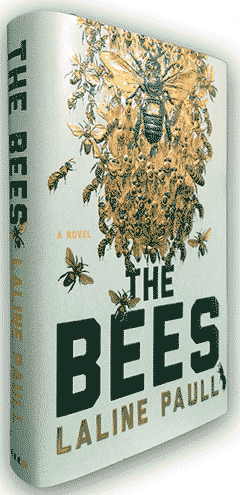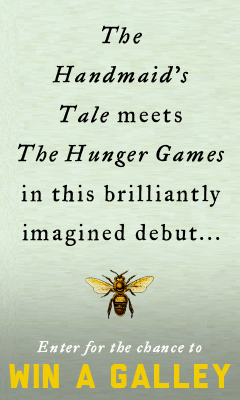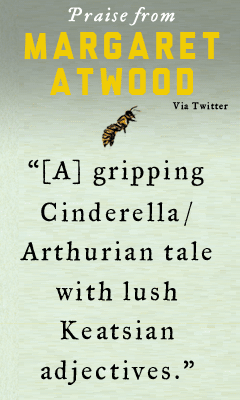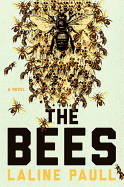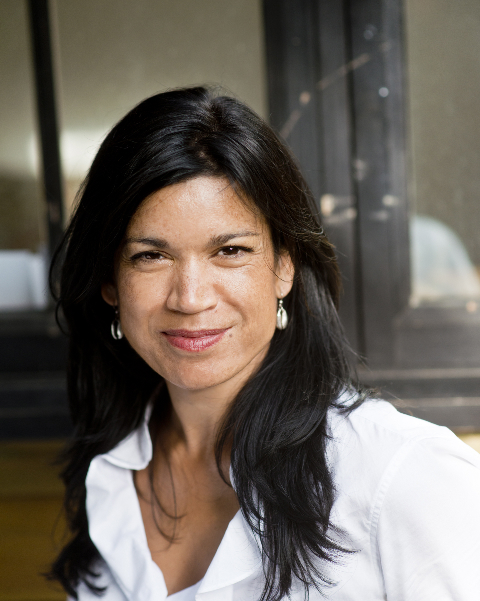The Bees
by Laline Paull
In the tradition of Watership Down and Redwall, Laline Paull's debut novel, The Bees, is an enthralling story that explores the intricate and brutal social order of the beehive. Paull's hive is a place of mystery and complexities, where religion holds sway with an array of strictly codified laws that coalesce around worship of the Queen, who sustains the hive with her Love. Of the many laws dictating the lives of the bees, paramount is Only the Queen may breed--a law enforced with horrendous efficiency by the fertility police. Individuality is also forbidden, a principle encapsulated in the oft-repeated mantra Accept, Obey, and Serve. So when Flora, a despised sanitation worker bee, discovers her ability to lay eggs, her life is immediately placed in jeopardy. Even more dangerous is Flora's determination to protect her offspring--at any cost.
Flora is different from the other sanitation workers--she was born with abilities that set her apart and almost lead to her execution at her hatching, but ultimately she is saved by the precept that "Variation is not the same as Deformity." The priestesses who hold the power of life and death in the hive see a use for Flora's unusual talents. The population of the hive is much reduced and food is becoming scarce, so Flora is put to work filling roles that would have otherwise been assigned other types of bees, including the risky task of foraging for nectar, which involves dodging wasps, spiders, and--perhaps most deadly of all--poison set by human hands.
Interweaving science with myth, The Bees immerses readers in a world that is intensely foreign and fraught with intrigue--in fact, the novel resembles Game of Thrones as much as Watership Down, with scenes of shocking violence and death. When the drones' mating season has passed, the worship they enjoyed from the female bees turns to nightmare, in a moment that seems inspired by the Maenads of Greek mythology who tore Orpheus to death. The religious elements are continued here, as the Queen illustrates: "And as you slew my sons your brothers, in sacrifice to Winter, so did I slay your several fathers, in sacrifice to Spring. Each one's life I took for love, and each year I tell this tale."
The bees will proceed to forget the horrors they have wrought against the drones, renewing their innocence for the next cycle of the seasons, in what is clearly an ancient rite. When the next generation of drones is born, the female bees will worship the males with the same enthusiasm as before, without a hint of what is to come. A single drone will emerge as a character who begins as Flora's enemy, but who will over the course of time become her only ally in her deadly game of hiding her eggs from the priestesses.
In addition to myth, the dialogue between Flora and other creatures is reminiscent of Aesop's fables; similarly, she must be clever to thwart their hostilities or occasionally benefit from their generosity. There is a lofty tone to these exchanges, perhaps because each creature is not an individual character so much as a symbol of that creature's characteristics. The wasp tends to be the boastful enemy who might be won over with appeals to its ego. The spider, which is much more dangerous, can see the future and delights in the prospect of the hive's destruction, bringing to mind the archetypal wicked witch. And like a witch, it trades constantly in hard bargains.
While hive life is filled with mortal dangers, Paull never loses focus about the most omnipresent danger: the outside world and the threat it poses not just to this hive, but to all bees worldwide. The spectre of global warming looms over the proceedings, making itself felt in numerous ways, from the diminishing number of bees to the harsh conditions of winter. Nature is cruel, The Bees reminds us, but that is because it must fight uncompromisingly for survival. This is especially true of the hive, a system so complex and delicate. Its rule of law must be brutal for its own protection in an increasingly hostile world. After all, even the human beekeepers who occasionally make an appearance are hardly equal to the task.
Yet despite the emphasis on violence and survival, the most vital thread of all does not turn out to be either one. Flora is willing to risk her own survival for the good of her eggs, of her companions, and of the hive as a whole. All the bees are willing to die for their Queen, whose devotion nurtures them. Even in the ruthless teeming of the hive, where execution is labeled a Kindness, the value that surfaces most powerfully in the end is love. --Ilana Teitelbaum
Watch The Bees trailer here.



